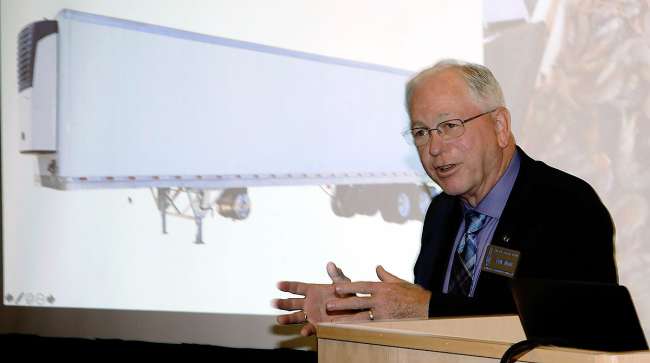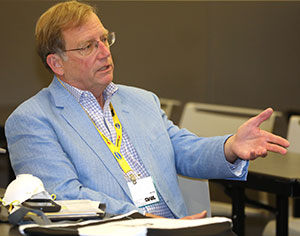Senior Reporter
TMC to Fund Study of Refrigerated Carriers

[Stay on top of transportation news: Get TTNews in your inbox.]
CLEVELAND — The Technology & Maintenance Council of American Trucking Associations will fund a study of refrigerated carriers with an emphasis on how they manage food safety with new technology and related maintenance implications.
The study gets underway as food safety issues continue to draw new concerns from regulators, food retailers put in place new requirements for suppliers and new sensor-based technologies proliferate with options for carriers.
Paul Menig, CEO at Business Accelerants, will collaborate with Charles Willmott, CEO at WillGo Transportation Consulting, to conduct the survey and analyze the results for TMC.

Charles Willmott, CEO at WillGo Transportation Consulting, by John Sommers II for Transport Topics.
The announcement was made at TMC’s Fall 2021 meeting.
“Health problems from food continue to be a particularly big problem,” Menig said. “It might have occurred way back with fecal matter in the field, or during the processing of the food.”
Or potentially, with mishaps during transport. Often a lot of backtracking is needed to identify where the contamination happened.
The Refrigerated Transport Study is the second TMC has launched recently focusing on trailers.
The initial survey a year ago was the North American Trailer Rental/Lease Company Survey. That survey asked 12 leading lease/rental companies, which operate 10% of all trailers, detailed questions to determine their expectations for next-generation trailers, and the companies’ knowledge and adoption of trailer technologies.
The second survey began in September and is scheduled to conclude in January. The final report is set for February, with a press conference in March.
The Refrigerated Transport Study will include more surveys and interviews compared with the first study. It will reach out to related organizations for supply chain information. TMC reported it is open to others helping with the study and sponsoring outreach through webinars and in-person presentations, Menig said.
Meanwhile, the Food and Drug Administration is proposing to establish additional traceability record-keeping requirements (beyond what is already required in existing regulations) for persons who manufacture, process, pack or hold foods designated for inclusion on its Food Traceability List.
The proposed rule, Requirements for Additional Traceability Records for Certain Foods, is a key component, the FDA reported, of its New Era of Smarter Food Safety Blueprint and would implement Section 204(d) of the FDA Food Safety Modernization Act.

Fleet managers find that healthy, happy drivers are key to business success. Stephen Kane of Rolling Strong says driver health starts with “being vulnerable enough to listen to somebody that knows about health.” Hear a snippet above, and get the full program by going to RoadSigns.TTNews.com.
At the same time, Walmart is implementing a program that started in February for better accountability of what its suppliers are doing, including accuracy of purchase orders, Menig said.
Phase 4 of Walmart’s Supplier Quality Excellence Program includes “handling and transportation, to be determined,” Menig said. “So we know what they are doing is going to come and impact us,” including most likely with pallets, load segregation and packaging.
Also, California is readying zero-emission requirements for TRUs sold or operated in California by Dec. 31, 2029.
Menig said the first study found about 65% of the reefer trailers at the rental and leasing companies were outfitted with telematics.
He said he expected by getting into deeper talks with people who are more focused on refrigerated transport, “we will see more of a need for a willingness among them to be the early adopters for technologies for smart trailers.”
These could include trailer location tracking devices, remote cargo temperature monitoring, electronic door locks and tire pressure management systems, among other information-generating features.
“All of these things have implications for maintenance, too,” Jack Legler, technical director of TMC, told Transport Topics after the presentation.
“It’s not only what the technology can do, but you have to be able to handle the data. The minimum for tractor-trailer communication 10 years from now is going to be 1,000 Base T,” or massive amounts of information, he said. 1,000 Base T is also known as the IEEE 802.ab standard, or a kind of Gigabit Ethernet standard over copper wiring, according to experts.
“It’s not simply going to be fixing a wire,” Legler added. “You will have to be a data diagnostician to go along with being a highly skilled electrical technician. You will have to understand what the data is that is going through that wire you are repairing.”
Want more news? Listen to today's daily briefing below or go here for more info:


